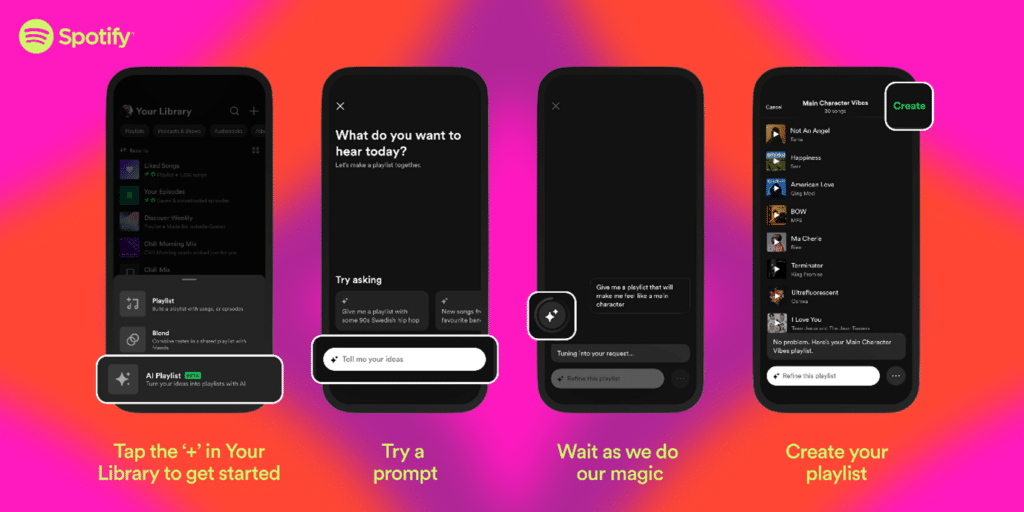Music has become an integral part of many people’s daily lives, serving as a common way to unwind and enjoy free time. Additionally, the music industry is enormous, with seemingly endless choices. Artificial Intelligence is entering this space, offering users the ability to explore new musical horizons and create playlists without doing it themselves, leaving this task to AI. This year, Spotify introduced these innovations, inviting its users to try out a new tool.
How Does AI Create a Music Playlist?
The first to experience this new feature on Spotify were app subscribers in the U.K. and Australia. Now, the AI-generated playlist function is also available to users in the U.S., Canada, Ireland, and New Zealand.
Although still in beta, users can already test out this innovation. The tool works by allowing users to describe the playlist they want to generate, such as romantic songs for a dinner at home, or a party playlist for friends. AI then generates a playlist that reflects the described mood. Notably, the descriptions don’t need to be brief, they can include creative ideas.

There is also the option to refine and further edit the description to improve the playlist. Additionally, the descriptions don’t have to be purely textual – they can be enhanced with visual elements such as emojis, colours, or even references to movie characters to help convey the desired playlist mood.
What Opportunities Does Spotify’s AI Playlist Feature Offer?
One of the main benefits of applying AI to playlist generation is the significantly reduced time spent searching for new music or songs that match a specific mood or theme. The process becomes faster and more efficient, as machine learning immediately suggests songs based on both the description provided and the user’s previous activity history.
Analysing past activity ensures that the playlist is personalized for the user, making it more likely to meet their preferences and expectations. Another key aspect is that AI continuously learns from users’ habits and requests, becoming more accurate over time in generating content.
The vast array of available music also means that AI can analyse large amounts of data to select the most fitting suggestions. This increases the likelihood of expanding one’s musical tastes and discovering new, up-and-coming artists – something that, from a different perspective, benefits the artists themselves by improving the visibility of lesser-known or emerging musicians.
Can We Fully Rely on an AI-Generated Playlist?
One of the important risks associated with AI in various fields, including music, is that its great potential for personalization may lead to a limited perspective. Much like social media algorithms create “filter bubbles,” AI in the music industry could lead to users being confined to a specific musical bubble, where over time they may view music from only one angle, limiting exposure to other genres or styles.
Moreover, it’s important to remember that AI is not infallible – it can make mistakes or misunderstand the deeper contexts of a user’s search or their emotional expression, resulting in playlists that don’t match the user’s expectations.
Additionally, in this version of Spotify, AI will not create playlists based on political messages or descriptions containing terms like “deceptive” or “dangerous.”
Final Word
Artificial intelligence is gradually becoming one of the new age’s DJ alternatives, offering its own generated music playlists. This is yet another tool that enhances user experience and opens new possibilities in the music industry.
Sources: Spotify, TechCrunch, Fast Company
